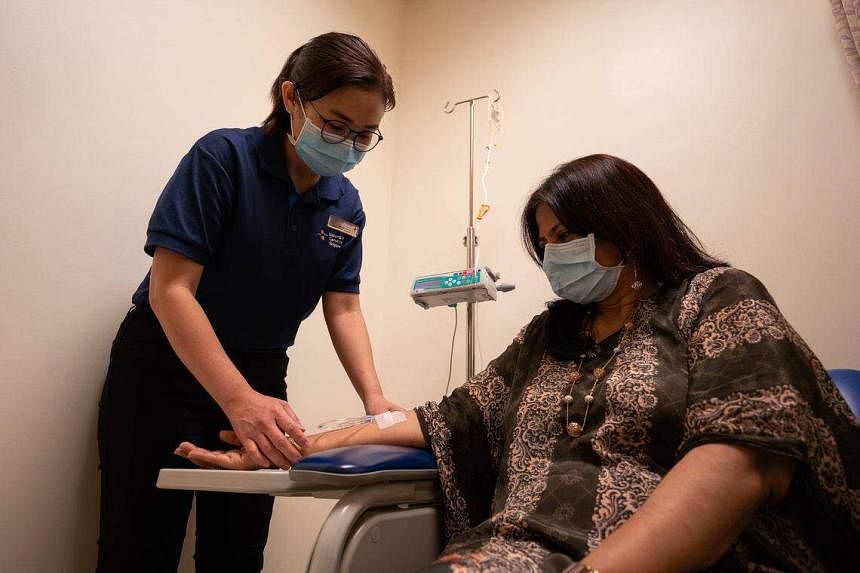SINGAPORE - A drug that protects bones from breaking will be administered at satellite clinics in the community instead of just at the National University Cancer Institute, Singapore (NCIS) in Kent Ridge, making it more convenient for cancer patients who need the treatment.
Jurong Medical Centre (JMC), one of the clinics running the NCIS on the Go programme, has already been offering short infusions of the drug called zoledronic acid since March, after getting approval from the Health Ministry.
NCIS plans to expand the service in 2023 to its two other community clinics – Keat Hong Family Medicine Clinic in Choa Chu Kang and Frontier Family Medicine Clinic in Clementi.
It also hopes to launch a satellite clinic in Serangoon in 2024.
Zoledronic acid prevents fractures caused by cancers.
It is also given to patients with early breast cancer who are on hormone therapy, to protect against osteoporosis.
Professor Lee Soo Chin, who heads NCIS’ haematology-oncology department, said: “This is infused straight into the bloodstream so the nurses in charge of the community clinics need to be schooled and patients stable enough to be referred there.
“Since these clinics are manned by oncology-trained nurses, we also have to be selective when it comes to the patients we see there.”
One of her patients, Ms Iffat Ara Nurjahan, is on hormone therapy and needs an infusion every six months to protect her bones from deteriorating. The 57-year-old interpreter, who lives in Woodlands, was diagnosed with stage 2B breast cancer four years ago and had undergone a lumpectomy to remove the tumour.
“If I were to travel by train to NCIS, it would take me 50 minutes, and I would have to wait at the clinic for at least an hour for my turn.
“Now it takes me only about 35 minutes by train to JMC and, as it is by appointment only, the nurse would be the one waiting for me rather than the other way around,” she said.

The NCIS on the Go clinic at JMC allowed only one infusion treatment a week when it started, but scaled up to one treatment a day from May.
“So far, eight infusions have been administered without problems. We are looking at 213 zoledronate infusions a year, and this means that by expanding the service to the other two clinics, it can potentially accommodate 27 per cent of the total zoledronate workload at NCIS,” Prof Lee said.
The idea of NCIS on the Go stemmed from former health minister Gan Kim Yong’s 2017 strategy of “beyond hospital to the community” to sustain quality healthcare as demand rises.
Since February 2017, NCIS on the Go has let cancer patients receive selected cancer services and treatments in the community, strictly by appointment.
These patients had their initial chemotherapy treatment at NCIS, but were certified as “low risk” and “safe” by doctors with regard to receiving subsequent treatment in the community.
This includes blood taking, caring for long-term intravenous lines, anti-cancer or supportive treatment that can be administered under the skin, and the removal of chemotherapy infusion pumps.
“By moving simple cancer treatments to the community, low-risk patients who live near these satellite centres benefit by saving on travelling time, waiting time as well as travelling costs,” Prof Lee said.
SBS Transit assistant manager Khairuddin Haron lives a 10-minute walk away from JMC in Jurong West, where he goes to get his peripherally inserted central catheter cleaned by a nurse twice a week.
The 34-year-old, who was diagnosed in June 2022 with Hodgkin’s lymphoma, a type of cancer that affects the lymphatic system, said he would otherwise “have to travel 40 to 50 minutes by train to NCIS and wait another 30 to 45 minutes”.

Prof Lee told reporters on Friday that the workload at the satellite clinics has increased by almost five times since 2018.
“In 2021, despite suspending services for seven weeks due to Covid-19, NCIS managed to decant 5.5 per cent of its workload to the satellite clinics. This grew to 9 per cent last year,” she said, adding that the projection for this year is 12.7 per cent. “Our long-term vision is to move 15 to 20 per cent of our workload to these community clinics.”
Prof Lee said that while NCIS looks after the western region, its doctors also see patients who live in the “northern and eastern parts of the island”.
“So in 2024, NCIS on the Go will have a satellite clinic in Serangoon.
“We are currently working with family clinics to see if there is space and that it is easily accessible by public transport.
“With our patients coming also from the east, we are looking to grow NCIS on the Go islandwide.”


